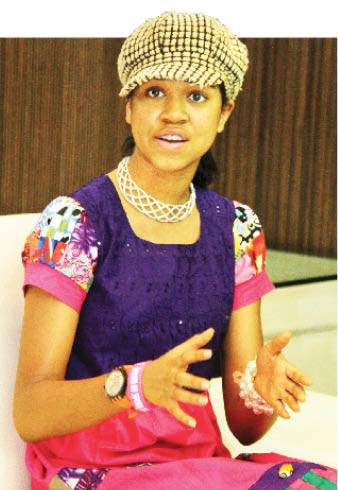How I discovered my filmmaking talent at 9 — Zuriel Oduwole
She started filmmaking at age nine. Her education project for the girl-child kicked off at age 10. Today, at 15, Zuriel Oduwole, a young film maker and avowed girl child empowerment advocate already has five films up her sleeves. With the support from Sahara Group, a local energy firm, Oduwole was in Lagos recently to […]


She started filmmaking at age nine. Her education project for the girl-child kicked off at age 10. Today, at 15, Zuriel Oduwole, a young film maker and avowed girl child empowerment advocate already has five films up her sleeves. With the support from Sahara Group, a local energy firm, Oduwole was in Lagos recently to hold a filmmaking class with select Nigerian girls. She spoke of her feats and the motivations in this interview.
Why did you choose filmmaking as a means of empowering girls in Africa?
My filmmaking experience actually started when I was nine. My education project started when I was ten. So, filmmaking started before my education project. In my recent documentary, I stated that I am a filmmaker and I make them compare a documentary that tells the story of a girl child education.
I started my filmmaking class in February 2016 in Namibia. I have also taken it to places like Kenya; I have done in Mauritius and Mexico, now I’m in Nigeria and would be heading to Ghana and Cote D’Ivore.
While I was in Namibia, I had about 25 youth who came out for the training and they were taught basic film-making skills like narration, animation, transition, voiceover, among others. And in November of that same year, which was few months later one of the girls that attended my session informed me that she was able to produce her own documentary. And currently, she is looking towards producing the second episode of that documentary. So by and large, the youth I’m teaching are using films to tell their own stories.
What is the focus of your partnership with Sahara Foundation?
I think I have gone very fast in the last five years, since I started my project at age 10. Sahara has shown they are serious about girls’ education, so it is easy for me to create a partnership, so we can do more together, for Girls Education in Africa, and also around the world. That would be so cool to do.
Through the partnership with Sahara Foundation, we will be empowering young ladies in Nigeria, Ghana and Cote D’ Ivoire who will be guided and mentored to create replicas of themselves for greater impact.
Ultimately, the goal is to give these girls who are mostly from underserved communities the power, skills and platform to tell their stories and make a living through film making.
Since you started, what have you been able to identify as major impediments to girl child education?
From what I have seen so far, there are number of reasons. However, there are two main reasons while girls are not in schools: economic and cultural reasons. In most places where parents have scarce resources and can only send one child, they usually send the boy ahead of the girls because they don’t see reasons why girls should go to school.
What’s your impression of the Nigerian movie industry?
Well, like I said earlier, this is the second time I would be coming to hold the training in Nigeria but the first was in partnership with the Sahara Group. So we chose a couple of countries I am meant to carry this out and Nigeria was one of them. After here, I would be heading to Ghana and Cote D’ Ivoire.
Aside teaching filmmaking, have you ever produced a film?
Yes, I have produced five documentaries since the age of nine. I have shot in five countries, Brazil, Ethiopia, Nigeria and Mauritius and some parts of the United States. And I ensured that those documentaries focused on girl child education. The one I shot in Brazil was during the World Cup in 2014. I took two footballs to different countries and I got people to sign on it to say that I am signing on it because I believe in girl child education. Thus, people like Governors, Ambassadors, Prize winners, hip hop singers, among others. That was my most recent one. But I have four others before that.
You have interviewed over 24 presidents and distinguished personalities. How has this shaped your opinion about the world?
Cool question. First, it lets me know how difficult it is to be President of any country. So like Nigeria, there are 180 million opinions, so that’s a difficult start already for the President. Sadly, girls have never been priority for many governments, so me talking to the Presidents is making a difference in places like Tanzania and Namibia and Cape Verde, and hopefully, Nigeria.
